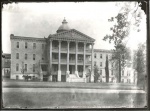Difference between revisions of "Portal:Featured Article Of The Week"
M-Explorer (talk | contribs) |
M-Explorer (talk | contribs) |
||
| Line 1: | Line 1: | ||
{{FAformat | {{FAformat | ||
| − | |Title= | + | |Title= Austin State Hospital |
| − | |Image= | + | |Image= Austin04382lg.jpg |
|Width= 150px | |Width= 150px | ||
| − | |Body= | + | |Body= Austin State Hospital was the first state facility of its kind built west of the Mississippi. In 1856, the governor of Texas signed a bill providing for the establishment of the Texas State Lunatic Asylum. Construction started in 1857, and the first patients were admitted in 1861. The facility was renamed the Austin State Hospital (ASH) in 1925. |
| − | + | Today, this original building serves as the administration building for a modern, innovative facility providing psychiatric care to a 38-county region in Central Texas. ASH admitted over 4400 patients in the fiscal year 2006, with about the same number of discharges, and has an average daily patient census of 292. The focus of treatment is stabilization of acute psychiatric illness and return to the community. | |
| − | + | The old Texas State Lunatic Asylum, which now houses the administrative staff of the Austin State Hospital, is the third oldest standing public building our state. With its completion in 1861 in the lush countryside north of Austin, the hospital stood as a beacon of hope and tolerance for the treatment of the mentally ill. [[Austin State Hospital|Click here for more...]] | |
}} | }} | ||
Revision as of 05:28, 11 November 2018
Featured Article Of The Week
Austin State Hospital
Austin State Hospital was the first state facility of its kind built west of the Mississippi. In 1856, the governor of Texas signed a bill providing for the establishment of the Texas State Lunatic Asylum. Construction started in 1857, and the first patients were admitted in 1861. The facility was renamed the Austin State Hospital (ASH) in 1925.
Today, this original building serves as the administration building for a modern, innovative facility providing psychiatric care to a 38-county region in Central Texas. ASH admitted over 4400 patients in the fiscal year 2006, with about the same number of discharges, and has an average daily patient census of 292. The focus of treatment is stabilization of acute psychiatric illness and return to the community.
The old Texas State Lunatic Asylum, which now houses the administrative staff of the Austin State Hospital, is the third oldest standing public building our state. With its completion in 1861 in the lush countryside north of Austin, the hospital stood as a beacon of hope and tolerance for the treatment of the mentally ill. Click here for more...
